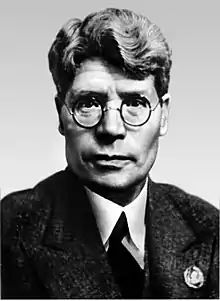Ivan Gubkin
Ivan Mikhaylovich Gubkin (Russian: Ива́н Миха́йлович Гу́бкин) (September 21 [O.S. September 9] 1871 – April 21, 1939) was a Russian geologist and president of the 1937 International Geological Congress in Moscow. He was a petroleum geologist particularly interested the region between the Volga and the Urals.

Gubkin's family came from the Belgorod area on South of Russia. He was well known to American geologists, as Goubkin, and attended the Annual Fieldtrip of the American Association of State Geologists in 1917.[1]
In 1921, he joined the Communist Party. He was elected to the Russian Academy of Sciences in 1929, and served as its vice-president from 1936 to 1939. Gubkin's book "The Study of Oil" (1932) developed theory on the origins of oil and the conditions necessary for the formation of oil deposits, and laid out the principles of oil geology. He led the studies of the Kursk Magnetic Anomaly from 1920 to 1925, which eventual led to the discovery of huge iron deposits. Gubkin was the editor of the journal Problems of Soviet Geology. In 1929 he received the Order of Lenin. During the first and second Five Year Plans, he was chairman of the "Production Committee" of the Academy of Sciences (1930–1936). Gubkin died in Moscow in 1939.
Named in his honor
- Academician Gubkin Prize for accomplishment in petroleum science and engineering
- I.M. Gubkin Russian State Oil and Gas University
- Gubkin, a town in Belgorod Oblast, Russia
- Gubkinsky, a town in the Yamalo-Nenets Autonomous Region of Russia
- Gubkina Street in Kazan
Notes
- Hotchkiss, W. O. (December 1917) "Annual Field Trip of the American Association of State Geologists" Science New Series, 46(1197): pp. 556–557, 557
References
- Safonov, Anatole (1939) "Ivan Mikhailovitch Goubkin (1871–1939)" AAPG Bulletin 23(8): pp. 1283–1284
Further reading
- Yu. Ya. Solov'ev (2007) "On the 125th birthday of Dmitrii Ivanovich Mushketov (1882–1938)" Stratigraphy and Geological Correlation 15(4):443–448.
